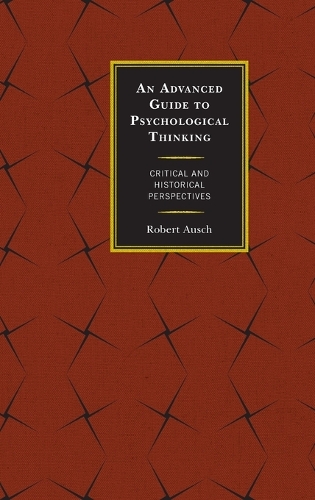
An Advanced Guide to Psychological Thinking: Critical and Historical Perspectives
(Hardback)
Available Formats
Publishing Details
An Advanced Guide to Psychological Thinking: Critical and Historical Perspectives
By (Author) Robert Ausch
Bloomsbury Publishing PLC
Lexington Books
6th May 2015
United States
Classifications
Tertiary Education
Non Fiction
Cognition and cognitive psychology
Psychotherapy
Philosophy
150
Physical Properties
Hardback
266
Width 160mm, Height 234mm, Spine 24mm
517g
Description
Psychology is a diverse assortment of fields with distinct referents, often using the same terms, and it is not always easy to identify its shared assumptions. At base, the academic variants tend to include the notion that mental activity takes place in hard-to-access inner spaces, making it more appropriate to study behavioral manifestations of it, yet all of it can be represented in an expert language with a confusing relationship to physiological mechanisms. An Advanced Guide to Psychological Thinking: Critical and Historical Perspectives focuses on several key areas in psychology: learning, the brain, child development, and psychotherapy, and identifies several conceptual tensions that ground psychological understanding of various phenomena. These include a tension between inside and outside, structure and function, higher and lower, and description and explanation; all have historically generated confusion at the heart of the discipline. As psychology was transformed into the study of consciousness in the late nineteenth century, and the science of behavior in the early twentieth, the disciplines of psychology struggled to distinguish between what was properly inside and what was outside mind, person, and organism as well as what forms the study of these insides would take. Additionally, it was unclear how to reconceive the traditional structures of the post-Cartesian mind in the terms of evolutionary functionalism without losing sight of the fact that the mind has its own organization or the historical connection between mind and higher forms of being. Psychologys influence today, particularly that of post-Freudian therapeutics, has extended far beyond the university, creating a therapeutic sensibility by which Westerners make sense of themselves and their world. An Advanced Guide to Psychological Thinking performs the vital task of helping psychology recognize its own foundations.
Reviews
This historical-philosophical treatment traces the twisting path from psychology's early assumptions, choices, blind spots, and misdirectionsto current explanations of what we claim to know about mind and behavior and why we seem to be so sure. Highlighting common themes that tie together disparate arenas within modern psychology,this thought-provoking corrective to triumphalism is useful for both mainstream and critical approaches to the field. -- Dennis Fox, University of Illinois at Springfield
Author Bio
Robert Ausch teaches psychology at New York University and Pratt Institute. He has published on a range of topics including social science methodology and the philosophy of psychology.
